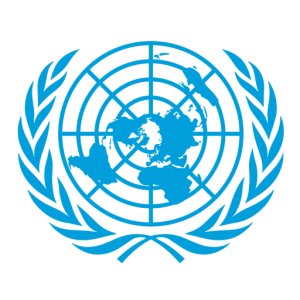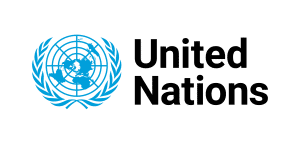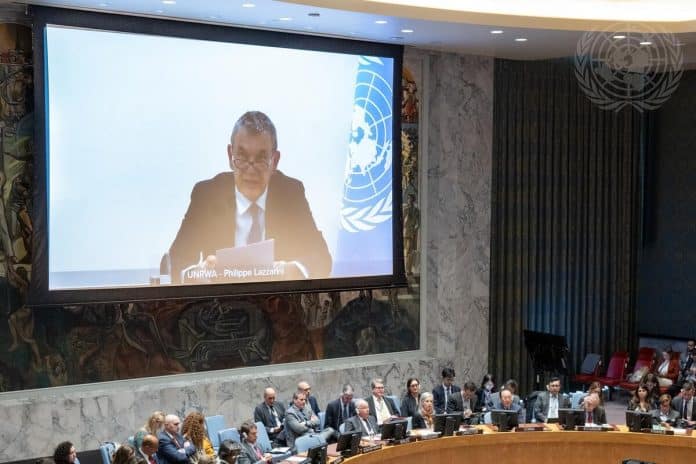Excellencies,
Distinguished Members of the Advisory Commission,
I would like to begin by thanking you for your support for the Agency during one of the darkest chapters in the region’s history.
Thank you to the Chair, Julieta Valls Noyes of the United States of America, for convening the AdCom at this critical time, as well as the Vice-Chairs, Mohamed Samir, Ambassador of Egypt to Jordan, and Ms. Henrike Trautmann.
I welcome you to your new role in this forum and will rely on your leadership and support in the difficult weeks and months ahead.
I would also like to thank Ms. Catherine Palmier, for continuing in her role as SubCom Chair, and Engineer Rafiq Khirfan of Jordan, and Mrs. Sirpu Tulla for continuing in your roles as Vice-Chairs of SubCom.
Dear colleagues,
I am addressing you during an unprecedented humanitarian catastrophe.
In the aftermath of the horrific Hamas attacks that killed more than 1,200 Israelis and foreign nationals, around 13,000 people in Gaza have been killed according to the Palestinian Central Bureau of Statistics.
More than two-thirds of those killed were reportedly women and children.
108 UNRWA staff members are confirmed killed.
We cannot even protect people under the United Nations flag.
Nearly 67 UNRWA installations have been hit, 17 of those directly.
Most of them were in the middle areas and in the south, where people were promised safety.
176 displaced people sheltering in these installations were reported killed and at least 778 injured. This includes the most recent attacks on two UNRWA schools, which resulted in scores of additional deaths and injuries.
The people of Gaza are not safe anywhere: not at home, not under the UN flag, not in a hospital, not in the North, and not in the South.
1.7 million people — almost 80 per cent of the population — are displaced from their homes and moved into half of the Gaza Strip.
More than 900,000 people are sheltering in UNRWA installations, including in the north.
The conditions in these shelters are indescribable.
They are massively overcrowded and shockingly unsanitary.
On average, 150 people share a single toilet and 700 people share a single shower when available.
These are breeding grounds for despair and disease.
The misery resulting from bombardment is compounded by the effects of a brutal siege.
Hunger and thirst are as widespread as fear and anxiety.
Municipal services, including pumping sewage water, are failing.
Telecommunications too.
We are seeing signs of civil order breaking down, as people are compelled to fend for themselves.
Everyone is terrified, especially children.
Children who should be in our schools to learn, not shelter from bombs.
In all this, UNRWA remains a lifeline for Gazans, thanks to the heroism of our staff on the ground.
Some 5,000 staff members in Gaza continue to work each day.
They live alongside the people they serve, and suffer the same deprivation, the same heartbreak.
They are helping to stretch limited resources to provide food, water, and basic sanitation services.
In addition to running shelters, our staff supply hospitals, bakeries, and desalination plants with the little fuel available.
Despite our best efforts, however, the humanitarian response in Gaza is glaringly insufficient.
Humanitarian aid is made conditional — dependent on political negotiations.
Aid workers are asked to be complicit in further displacing a population.
Water, food, medicine, and fuel are being used as weapons of war.
The trickle of aid allowed in does too little to address the immense needs of Gazans.
The number of trucks that entered Gaza in the last month is roughly equivalent to the number that typically entered over two days before the war.
The fuel allowed in by the Israeli Authorities only covers half the daily critical needs, compromising our entire aid operation and jeopardizing the survival of civilians.
We continue to advocate for the opening of additional crossing points like Kerem Shalom to no avail.
The siege is a collective punishment.
Conditioning humanitarian assistance is also a collective punishment.
Members of the Advisory Commission,
The immediate challenges in Gaza should not overshadow the devastating, long-term impact of this conflict on Gaza’s children.
Across Gaza, schools have turned into shelters.
The quality education UNRWA offered just weeks ago seems a distant dream.
300,000 students and almost 2,000 trainees are missing out on education.
For students in Gaza, this is the third year out of the last four that their education has been severely disrupted.
First COVID, then short-term escalations, and now this life-altering crisis.
Even if the conflict ends tomorrow, many of our schools are damaged or sheltering hundreds of thousands of displaced people.
The education UNRWA provides has been shown to foster understanding, tolerance, cultural identity, and gender equality.
But when my colleague Farid, who used to head our education programme in Gaza, meets his students in shelters, they ask him why UNRWA taught them about human rights and tolerance, when these principles do not apply to them.
What should he tell them?
UNRWA has developed a three-phase plan to support the reintegration of students into learning.
It begins with mental health and psychosocial support, progresses to providing non-formal education, and finally facilitates the re-integration of students in formal education.
But the implementation of this plan requires a ceasefire and funding.
Without it, we could see Gazan children out of education for years.
Dear colleagues,
While all eyes are on Gaza, the situation in the West Bank, including East Jerusalem, is dangerously deteriorating.
Violence has reached levels not seen in the last 15 years.
Since October 7, 200 Palestinians, including 52 children, have been killed by Israeli forces, in addition to eight, including one child, by settlers.
Israeli Forces are conducting daily incursions into refugee camps, with up to 40 raids per day.
Rising settler attacks and movement restrictions have displaced more than 1,000 people in the West Bank since 7 October.
Restrictions on the movement of people and goods have strongly impacted the economy.
The situation is seriously undermining UNRWA’s ability to deliver services, particularly education. Over 10,000 students in refugee camps in northern West Bank, Hebron H2, East Jerusalem and Jericho area are especially impacted.
Fear and anxiety are growing among Palestinians who are increasingly subjected to harassment and violence, barred from employment, and denied free movement.
Along the Israel-Lebanon border, clashes are intensifying.
There are serious concerns that this could turn into a full-blown conflict.
The tension in several Palestine Refugee camps in Lebanon has been simmering for years.
The latest conflict between Palestinian factions in Ein El Hilweh refugee camp caused the displacement of 4,000 people. UNRWA schools, which provide education to nearly 6,000 children, were rendered unusable.
This occurs amid unprecedented economic hardship for Palestine Refugees, who have virtually no economic prospects in the country, which itself is in a state of financial collapse and political paralysis.
In Syria,
Palestine Refugees are confronting one disaster after another.
They have endured conflict, economic crises, and a devastating earthquake.
The economy has collapsed, security is deteriorating, and the humanitarian situation keeps worsening.
In Jordan, widespread protests are taking place across the country in solidarity with the people of Gaza.
These protests happen against a backdrop of soaring poverty and unemployment rates. This has the greatest impact on the most vulnerable, including Palestine Refugees from Syria and those who came from Gaza in 1967.
Members of the Advisory Commission,
Since 7 October, the world has looked to UNRWA to protect and aid the civilian population in Gaza.
The Agency has received many generous contributions towards its flash appeal.
But the backbone of the Agency — our core budget, our staff– remains severely underfunded.
Even now, amid the unprecedented violence in Gaza, the largest UN agency providing humanitarian support on the ground does not have yet enough funds to pay its staff until the end of the year.
This is unacceptable. I call for you to carry us and our critical services until the end of the year.
We must also ensure the availability of sufficient funds to discharge our obligations towards staff who have been killed, injured, and displaced in Gaza.
This will be done through the payment of benefits to which they are entitled and other measures — I very much welcome the advice and support of the Advisory Commission in this regard.
This is the time to keep UNRWA strong.
It is the time to enable its stabilizing effect in a highly volatile environment.
With the calamity in Gaza, alarming violence in the West Bank, protracted conflict in Syria, fragile stability in Jordan and the near collapse of Lebanon, this is the time to stand firmly with UNRWA, which remains a beacon of hope amidst despair and destruction.
During previous Advisory Commission meetings, I repeatedly stressed how the de-prioritization of the Israeli-Palestinian conflict has translated into the chronic underfunding of UNRWA.
On 6 October, the Agency was already so weakened that it was heading towards financial implosion.
Yet, since then, UNRWA has established itself as the most authoritative international voice on the tragic situation in Gaza.
This is primarily thanks to our staff on the ground and colleagues supporting them.
States, the media, and political analysts have all sought UNRWA’s views, figures, and policy advice.
They all recognize that with its huge footprint in the local community, UNRWA is a pillar of strength for civilians in Gaza.
But to play this stabilizing role in Gaza and beyond, UNRWA requires a sustainable model with predictable and sufficient income.
Over the last two years, I have put forward several solutions, none of which have been the game-changer that Palestine Refugees, Host Countries and the region need.
Now more than ever, I strongly urge you as Members of the Advisory Commission to step up, be bold and help define solutions that ensure a stable and predictable UNRWA which remains the international community’s greatest asset in the region.
Dear colleagues,
In conclusion, a war of narratives is being waged to dehumanize Palestinians and de-legitimize UNRWA.
Disturbing references to Palestinians as “human animals” and calls for their expulsion from Gaza are attempts to normalize a disgraceful and dangerous rhetoric.
It seems that extremists are joining forces to also undermine the Agency.
Some accuse UNRWA of betraying the people of Gaza and facilitating the transfer of the population to the South.
The other propagates insidious claims that our schools and employees teach hatred and violence.
The Agency has spared no effort to ensure that its teaching promotes UN Values and UNESCO standards.
It has invested heavily in training staff members to uphold humanitarian principles.
All alleged breaches are investigated and dealt with promptly.
It is absurd that alleged breaches by a few are allowed to tarnish the reputation of a UN Agency and more than 28,000 dedicated and professional staff.
These obsessive attempts to discredit the work of the UN and its personnel are unacceptable and harmful.
We cannot accept that a tragic humanitarian situation is manipulated to advance a political agenda.
As Members of the Advisory Commission, I urge you to defend with conviction the Agency that you know so well.
More than ever, we need you to safeguard your decades-long investment in the education of Palestine Refugees.
More than ever, we must do all we can to assuage inflammatory language that entrenches islamophobia and antisemitism globally.
Finally, Madam Chair,
Every week we hold a memorial service at UNRWA to honor our colleagues killed. These were teachers, engineers, sanitation workers, nurses, doctors and more. According to our information, most were killed with their family members including their children. I never believed that as Commissioner General I would be planning memorial services for my staff in advance. This cannot continue.
The present situation is dire. It can and will get much worse unless we act.
We need an immediate humanitarian ceasefire.
We need respect for international humanitarian law so civilians are protected, and humanitarian organizations can work unhindered.
We need a meaningful supply of humanitarian aid and commercial goods flowing into Gaza. The siege must be lifted.
We need sufficient fuel, on which the entire aid operation and the survival of the population depend.
We need the support of the Advisory Commission to make it clear to the world that the attacks on UNRWA are baseless and malicious.
We need immediate funds to continue our life-saving operations and end the vicious cycle of debt eroding the Agency.
We need your leadership to ensure that UNRWA remains a strong, stable and predictable partner during this turbulent time.
We need your political will to end the perpetual cycle of violence and to work together towards a Middle East where all people can co-exist, feel secure, and realize their rights and full potential.
Thank you.
Per saperne di più clicca qui.


